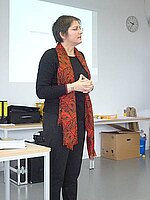Group 6: OECD policies, PIAAC and national adult education policies

Comparative Group 6: OECD policies, PIAAC and national adult education policies
adult education policies, intergovernmental bodies, testing
In recent times, comparison has become a relevant issue in adult education policy planning and decision. Particularly the Organisation for Cooperation and development (OECD) has had a real policy salience through comparative testing, namely with the programme for the International Assessment of Adult Competencies (PIAAC).
PIAAC has been considered a ‘governing technology’: it is a relevant tool for the redefinition of the understanding of adult education, owing to the stress on (lifelong) learning (Rubenson, 2015); and it is a significant tool for the governance in education as it became a mechanism through which education and training systems are measured and made accountable (Grek, 2013).
Through PIAAC the OECD has reinforced the role of intergovernmental bodies in adult education policy on a global scale. Additionally, several authors have argued that there is an interaction of international organisations (such as OECD) activity and national education and training systems when policy definition, implementation and assessment are considered. However, if PIAAC results are often mentioned in policy discourses, the introduction of national/regional reforms stressing (lifelong) learning and skills can significantly differ and show quite different expressions (Jakobi, 2012).
Comparative research question:
How has the PIAAC discourse been shaping national/regional adult education policies (discourses and practices) in recent years?
Context of comparison:
The context of comparison privileged in this Group Work will be the national/regional level, namely adult education policy discourses (laws/regulations/financing programmes) and practices (forms of adult education and training provision - adult education and training programmes and activities, institutional perspectives of adult education and training promoters) referring or influenced by the PIACC results.
Categories of comparison:
- PIAAC results in national policy discourses (laws/regulations/financing programmes)
- impact of and reaction to PIAAC results in practices (forms of adult education and training provision established, adult education and training promoters’ perspectives)
- similarities and differences of the OECD understanding of adult education, lifelong learning and skills in national/regional contexts and contexts of adult education and training provision
References:
Grek, Sotiria (2013). Expert moves: international comparative testing and the rise of expertocracy. Journal of Education Policy, 28:5, pp. 695-709 (doi: 10.1080/02680939.2012.758825); Jakobi, Anja P.(2012). International organisations and policy diffusion: the global norm of lifelong learning. Journal of Internaitonal Relations and Development, 15, pp. 31-64 (doi:10.1057/jird.2010.20).
Rubenson, Kjell (2015). Framing the adult learning and education policy discourse: the role of the Organisation for Economic Cooperation and Development. In Marcella Milana and Tom Nesbit (Eds.), Global Perspectives on Adult Education and Learning Policy. Hampshire (England): Palgrave Macmillan, pp. 179-193.
Prof. Paula Guimarães, University of Lisbon, Portugal
Paula Guimarães is an assistant professor at the Instituto de Educação, Universidade de Lisboa since 2012. She did her PhD on Education Policies, in Adult Education, and has been studying adult education policies established, implemented and assessed at national and supranational levels. Her main interests have been the link that might be established among different levels of political intervention, namely on how local actors and local promoters of adult education public policies understand adult education and lifelong learning (defined and established on a supranational, national and regional levels).
Prof. Reddy, Indira Gandhi National Open University, New Delhi, India
M.L. Reddy is an assistant Professor at the School of Education, Indira Gandhi National Open University, Maidan Garhi, New Delhi, India. He received his PhD in the field of adult education from Sri Venkateswara University in Andhra Pradesh. He is currently the Coordinator of Post-Graduate Certificate in Adult Education (PGCAE), Post-Graduate Diploma in Adult Education (PGDAE) and Master of Arts in Adult Education (MAAE) programmes offered by IGNOU. In addition, he is the coordinator of 12 courses including courses of "Adult Education" specialisation area under MA (Education) programme and a course "Open and Distance Education" of BEd programme of IGNOU.


